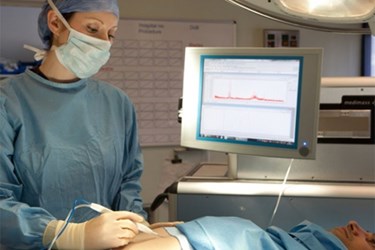Smart Knife Could Improve Cancer Treatment
By Joel Lindsey

A group of researchers in the United Kingdom is developing a “smart” knife capable of analyzing the chemical composition of tissue and providing surgeons real-time feedback during surgery. Reports indicate that such a device could significantly improve cancer treatment techniques.
The device, called an “iKnife,” brings together three innovations: electrosurgery, a computerized database of signatures for various types of cancer, and a mass-spectrometer tailored for use in the surgical theater. The project is led by Dr. Zoltán Takáts of Imperial College London.
A recent article published by the European Research Council (ERC), the organization that which has helped fund the iKnife project, detailed how the device works.
“Mass-spectrometers measure the mass-to-charge ratio of ionized (charged) particles by passing them through electric or magnetic fields. Scientists use them to analyze the chemical composition and structure of samples,” the article explained. “The big breakthrough for Dr. Takáts came when he realized that new surgical techniques — such as ultrasound-, laser- or electro-surgery — produced charged particles of tissue which were ideally suited as input to a mass-spectrometer.”
During surgery, the iKnife uses an air pump to pull charged particles from the incision site to the spectrometer. The spectrometer then analyzes the particles and draws on the database of cancer signatures to deliver real-time data to surgeons.
Researchers hope that providing this data to surgeons will allow them to make more precise cuts, getting rid of infected tissue while avoiding cutting out any additional healthy tissue.
Takáts and his team published results from early trials of the device in the journal Science of Translational Medicine.
“We didn’t expect to get this far in the project when we made the original proposal in 2007,” Takáts said. “But in the six weeks since our paper was published we’ve gone on to complete our clinical experiments and shown the technology is ready for application — so we are now close to beginning official clinical trials with a view to regulatory approval.”
While the iKnife was designed for electro-surgical cancer operations, it could also be compatible with other types of surgery, such as hydro- and laser-surgery. The ERC also reports that the device could eventually be used for analysis of mucous membranes and the respiratory, urogenital, or gastrointestinal systems.
“The millions of bacteria that live in — and on — us may be linked to cancers and illnesses like diabetes,” said Takáts. “Identifying them may help in diagnosis and treatments. We now have a unique tool to look into the fine details of those interactions — leading to new approaches and therapies.”
Image Credit: Imperial College London
